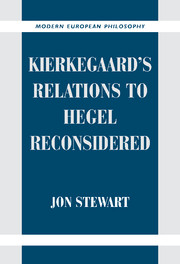Book contents
- Frontmatter
- Contents
- Acknowledgements
- Abbreviations of Primary Texts
- Preface
- Introduction
- 1 Kierkegaard and Danish Hegelianism
- 2 Traces of Hegel in From the Papers of One Still Living and the Early Works
- 3 The Ironic Thesis and Hegel's Presence in The Concept of Irony
- 4 Hegel's Aufhebung and Kierkegaard's Either/Or
- 5 Kierkegaard's Polemic with Martensen in Johannes Climacus, or De omnibus dubitandum est
- 6 Kierkegaard's Repetition and Hegel's Dialectical Mediation
- 7 Hegel's View of Moral Conscience and Kierkegaard's Interpretation of Abraham
- 8 Martensen's Doctrine of Immanence and Kierkegaard's Transcendence in the Philosophical Fragments
- 9 The Dispute with Adler in The Concept of Anxiety
- 10 The Polemic with Heiberg in Prefaces
- 11 Subjective and Objective Thinking: Hegel in the Concluding Unscientific Postscript
- 12 Adler's Confusions and the Results of Hegel's Philosophy
- 13 Kierkegaard's Phenomenology of Despair in The Sickness unto Death
- 14 Kierkegaard and the Development of Nineteenth-Century Continental Philosophy: Conclusions, Reflections, and Reevaluations
- Foreign Language Summaries
- Bibliographies
- Subject Index
- Index of Persons
14 - Kierkegaard and the Development of Nineteenth-Century Continental Philosophy: Conclusions, Reflections, and Reevaluations
Published online by Cambridge University Press: 13 March 2010
- Frontmatter
- Contents
- Acknowledgements
- Abbreviations of Primary Texts
- Preface
- Introduction
- 1 Kierkegaard and Danish Hegelianism
- 2 Traces of Hegel in From the Papers of One Still Living and the Early Works
- 3 The Ironic Thesis and Hegel's Presence in The Concept of Irony
- 4 Hegel's Aufhebung and Kierkegaard's Either/Or
- 5 Kierkegaard's Polemic with Martensen in Johannes Climacus, or De omnibus dubitandum est
- 6 Kierkegaard's Repetition and Hegel's Dialectical Mediation
- 7 Hegel's View of Moral Conscience and Kierkegaard's Interpretation of Abraham
- 8 Martensen's Doctrine of Immanence and Kierkegaard's Transcendence in the Philosophical Fragments
- 9 The Dispute with Adler in The Concept of Anxiety
- 10 The Polemic with Heiberg in Prefaces
- 11 Subjective and Objective Thinking: Hegel in the Concluding Unscientific Postscript
- 12 Adler's Confusions and the Results of Hegel's Philosophy
- 13 Kierkegaard's Phenomenology of Despair in The Sickness unto Death
- 14 Kierkegaard and the Development of Nineteenth-Century Continental Philosophy: Conclusions, Reflections, and Reevaluations
- Foreign Language Summaries
- Bibliographies
- Subject Index
- Index of Persons
Summary
Instead of Kierkegaard's Relations to Hegel Reconsidered, the present study might with equal justice be entitled Kierkegaard's Relations to Danish Hegelianism since the investigation has again and again led back to the Danish context in which Hegel's thought was employed and critically discussed at the time. However, the value of this study lies not so much in its treatment of Kierkegaard's relation to the forgotten figures of the Danish Hegelian movement but rather in the ways in which the interpretation of Kierkegaard presented here will affect what has come to be the standard reading of nineteenth-century European philosophy. The emphasis on Kierkegaard's relation to the Danish Hegelians will doubtless strike many readers as overly specialized and of purely historical interest. Yet, if the research put forth in the present investigation is correct, then the standard picture of Kierkegaard's role in the development of nineteenth-century European philosophy will need to be substantially revised.
The goal of the present chapter is to sketch the most significant of these revisions. In order to appreciate the importance of these, it will be necessary to cast a brief glance at the common picture of Kierkegaard's place in European thought vis-à-vis Hegel that has been produced as a result of the general paradigm presented by Thulstrup and others. I will begin by reviewing the main conclusions of the present study in order to obtain an overview of the mass of information examined here.
- Type
- Chapter
- Information
- Kierkegaard's Relations to Hegel Reconsidered , pp. 596 - 652Publisher: Cambridge University PressPrint publication year: 2003

